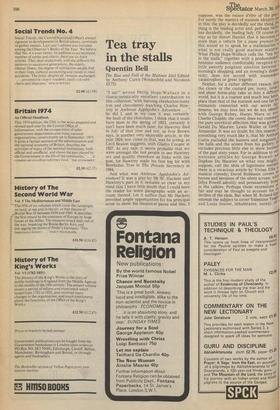Tea tray in the stalls
Quentin Bell
The Rise and Fall of the Matinee Idol Edited by Anthony Curtis (Weidenfeld and Nicolson £3.75) "I sat" writes Philip Hope-Wallace in a characteristically excellent contribution to this collection, "with burning cheeks(too many ices and chocolates) watching Charles Hawtrey in Ambrose Applejohn's Adventure ..." So did I, and in my case it was certainly the fault of the chocolates. I think that it must have been in the spring of 1923, certainly it can't have been much later, for Hawtrey died in July of that year and not, as Ivor Brown says, in another. very enjoyable article, in the year 1924; nor, come to that, was he acting, as Cecil Beaton suggests, with Gladys Cooper in 1927. At any rate, it seems probable that we were amongst the last people to see Hawtrey act and qualify therefore as links with the past, for Hawtrey made his first big hit with Beerbohm Tree in The Private Secretary in 1884.
And what was Ambrose Applejohn's Adventure? It was a play by Mr W. Hackett and Hawtrey's part in it remains so clear in my mind that I have little doubt that I could bore the reader for some paragraphs with an account thereof. Let it suffice that Mr Hackett provided ample opportunities for his principal actor to show his theatrical paces and this, I suppose, was the raison d'être of the pied For surely the essence of matinee idolatrYll,e,' in this: the play is decidedly not the thing, hl` thing is the leading actor and, perhaps rather' less decidedly, the leading lady. Of course onei may so far distort Hamlet that it becomes n°1 more than a vehicle for a jeune premier Nit this would so to speak be a matinisation what is not really good matinee materia' What Philip Hope-Wallace calls the "tea tte in the stalls," together with a predominant feminine audience comfortably receptive t° little sweetly poignant emotion between morning's shopping and an evening's donles' ticity, does not accord with tremenclou
catastrophes or great tragedy. p, Neither, for a rather different reason,
the clown or the custard pie; irony, Itinac and sheer horse-play take us into a differen, world, but it is a coarser and much less her01°, place than that of the matinee and one far legi intimately connected with our secret dreams; we may love but we do not identl" with George Robey, Harpo Marx or eve Charlie Chaplin; the comic does not conunl the pure uncritical affection that was given t Gerald Du Maurier, Lewis Waller or Geoff Alexander. It was no doubt for this reason, °' something very much like it, that Mr Anthoil Curtis excluded the busters and songstersS the halls and the screen from his gallery, 11,, excludes precious little else in show busine' of the past sixty years. For in addition to yell' welcome articles by George Rowell at Daphne Du Maurier on what one mighty suppose, call the idols of legitimate matine,i there is a vivacious article by Vivian Ellis a musical comedy; David Robinson covers t!1 heroes and heroines of the silent screen, Dilys Powell adroitly and persuasively britle. in the talkies. Perhaps these extensions af[ fair and may be thought to account for tui, decline of the idols. But when M. Roland Gae extends the subject to cover Valentine Tessi, and Louis Jouvet, inhabitants, surely,
very different theatre, one feels that Mr Curtis !night as well have gone the whole hog and Included an article on Donald Duck.
The subject, it must be allowed, is of its nature untidy but, equally, no attempt has been made to give it strict definition. There is no great harm in this so long as the reader knows what to expect and if, in picking this book from the stall, he glances at the excellent illustrations he will gain a fair notion. But with so broad a scope and so many contributors the standard of writing is bound to be unequal. There are pages of fairly rapid biographical summary, lists of half forgotten names which fail to hold the reader's attention, He begins to wish that this had been a rather different kind of book with far more Pictures (for the pictures are always eloquent) and a good deal less text. This impression is reinforced (and the fact is not altogether to the reader's credit) by the tone of unstinted admiration which seems to be maintained throughout. It ought to be satisfactory to k,now how talented these actors and actresses all were, it ought to be even more satisfactory to learn that nearly all of them had hearts of gold. Morally, the theatrical scene appears in the highest degree commendable. But it does lead to an anodyne prose style, and one falls upon the few crumbs of malice which are Provided with discreditable but understandable relish.
Quentin Bell has been Professor of the History anI Theory of Art at Sussex University since 1967.



































 Previous page
Previous page